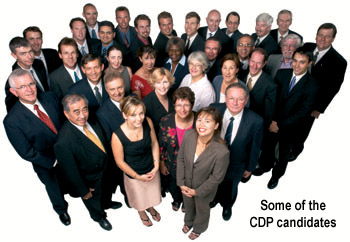On Saturday, 26 February 2005 the Gallop Labor Government was re-elected for a second four-year term. Four years earlier at the 2001 state election, One Nation delivered 10 seats to Labor, giving Labor a seven-seat majority in the Legislative Assembly. At the recent state election the breakdown of One Nation appears to have contributed to both major parties increasing their primary vote significantly, but with only a few seats changing hands. In the new Legislative Assembly Labor has been returned to government with a seven-seat majority. In the new Legislative Council Labor has 16 members, and the Liberal/National coalition also has 16. Sadly, this means that the Greens (whose numbers have been reduced from five to two) will still continue to hold the balance of power.
 Labor’s victory is disappointing to Christian and pro-family groups because it means that the worst aspects of the government’s social “reforms” will not be repealed during the next four years. Fortunately, Labor has not begun its second term by promising, as it did in the first term, a raft of radical social changes.Hopefully, then, the next four years will not be as unpalatable to Christians as the first four.
Labor’s victory is disappointing to Christian and pro-family groups because it means that the worst aspects of the government’s social “reforms” will not be repealed during the next four years. Fortunately, Labor has not begun its second term by promising, as it did in the first term, a raft of radical social changes.Hopefully, then, the next four years will not be as unpalatable to Christians as the first four.
The Christian Democratic Party was the only party to consistently remind West Australians about Labor’s treacherous social legislation, including granting homosexual and lesbian couples the right to adopt children, lowering the age of consent for sodomy from 21 to 16 years of age, decriminalising cannabis use and cultivation, removing protection from human embryos, and attempting to legalise prostitution. On each of these matters CDP proposed compassionate solutions that would protect marriage, families, young men and young women, children, and the unborn.
CDP has lifted its vote substantially since the 2001 election. In 2001, CDP received 9,893 votes for the Legislative Assembly.In 2005, CDP increased its vote by over 300 per cent to 31,444 primary votes for the Legislative Assembly.
In 2001, CDP fielded 13 candidates in 13 Legislative Assembly districts. In 2005, CDP fielded 57 candidates in 57 Legislative Assembly districts.CDP was one of only four parties (Liberal, Labor, Greens and CDP) to field candidates in every district throughout WA.
In 2001, CDP fielded six candidates in three Legislative Council regions. In 2005, CDP was again, one of only four parties to field a team of candidates in each of the six Legislative Council regions throughout WA.
In 2001, CDP received 16,105 votes for the Legislative Council. In 2005, CDP increased its vote by over 150 per cent to 25,058 primary votes for the Legislative Council.
In 2001, CDP occupied the seventh position in the Legislative Council, behind the Labor Party, the Liberal Party, One Nation, the Greens, the Australian Democrats, and the National Party. In 2005, CDP established itself as the fourth largest political party in WA, behind the Labor Party, the Liberal Party and the Greens, but ahead of the National Party, Family First, One Nation, the Australian Democrats, and other micro-parties. While CDP has enjoyed truly remarkable growth over the past four years, One Nation, the Greens, the National Party, and the Australian Democrats have all diminished in size.
In 2001, no CDP candidates came close to being elected to parliament. In 2005 two CDP candidates came close to being elected, and others did remarkably well.
Dr Lachlan Dunjey stood as the CDP Upper House candidate for the Agricultural Region.He missed out on the fifth and last seat by just 91 votes. The last seat went to Margaret Rowe, a Liberal party candidate, who was elected on Lachlan’s preferences. After the result was announced, Lachlan wrote to supporters, “I am disappointed for the sake of so many who put so much work into this campaign but Christians have made a mark in State politics more than ever before … we are called to be faithful, not necessarily ‘successful’ in the eyes of the world.”
I stood again as the CDP candidate for the North Metropolitan Region. In 2001, I received a total of 7,698 votes prior to being eliminated. In 2005 I received preferences from the Public Hospital Group, One Nation, Family First, and the Liberal Party and increased my total with preferences by over 350 per cent to 28,799 votes. After the election, I wrote to friends, “From my perspective it would have been good if either Lachlan or I had been elected, but even though I feel somewhat weary about the whole process, I really feel the need to press on. In the meantime, I really enjoy working for Life Ministries. I believe it is a useful and respected ministry that has provided help to hundreds of churches and thousands of families on a broad range of concerns to Christians.”
(Family First Party also came close to electing their candidate Linda Rose to the Upper House in the South-West Region. If the National Party had given its preferences to FFP instead of the Greens, Linda would have been elected instead of the Greens candidate Paul Llewellyn.)
The Christian Democratic Party came extremely close to electing its first candidates to the West Australian parliament. This should be seen as an encouragement to Christians and to people within the Christian Democratic Party to keep praying and persevering until committed Christians are elected to parliament.



